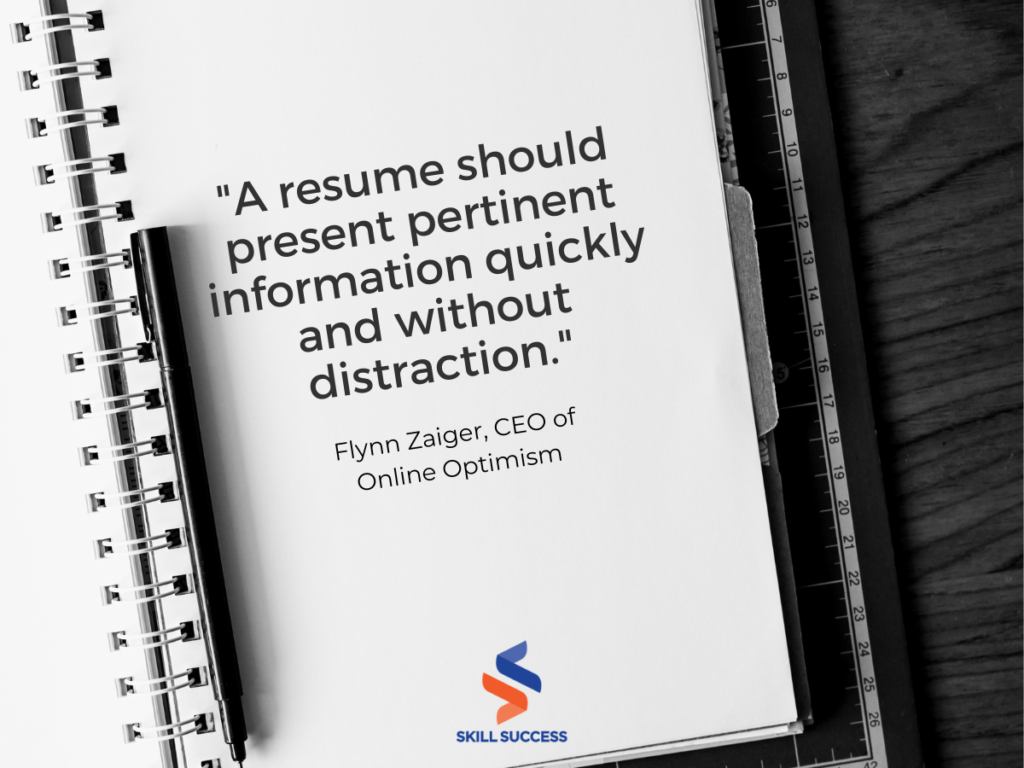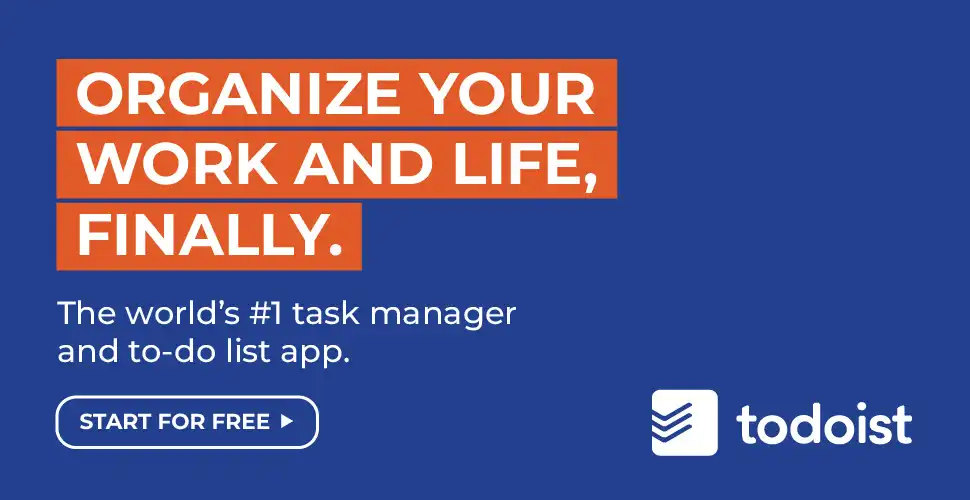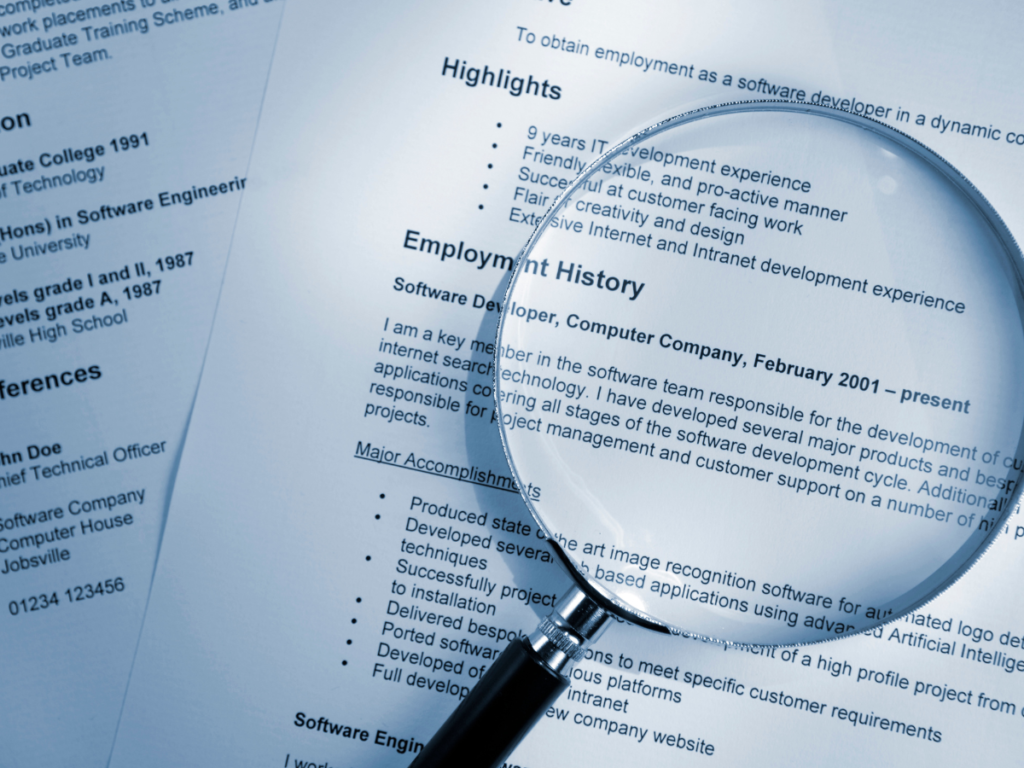We’ve all heard the saying, “First impression lasts,” and when it comes to your professional journey, your resume is that all-important first impression. Your resume is like a sneak peek into your career story, a glimpse that employers use to decide if you’re the perfect match for their team.
Picture this: you’ve discovered your dream job, polished your resume, and hit that “send” button with excitement. But what if I told you that some of the most common mistakes made on a resume could stand between you and that dream job? That’s right, even small missteps can have big consequences.
I’ve talked to experts who’ve seen it all – from hiring managers who shuffle through stacks of resumes to career coaches guiding folks like you towards success. They’ve generously shared their wisdom to help you dodge the pitfalls and stand out for all the right reasons.
They’re also dishing out advice on how to transform these missteps into opportunities for growth. And here’s the best part – you don’t need a magic wand or superpowers to make it happen. Just a little insight and some learning from career development courses can go a long way.

Expert Roundup: Most Common Mistakes Made on a Resume
Leaving Behind the LinkedIn Link
It’s not just about paper anymore. One common resume blunder that might not catch your eye right away is skipping the link to your LinkedIn profile. You see, your resume is like a snapshot of your professional life, and LinkedIn? Well, that’s the whole photo album.
Jessica Peskin, the Chief Finder of Keepers at Global Recruiters of Denver, has seen her fair share of resumes, and she’s got a nugget of wisdom to share:
“LinkedIn is now a modern extension of your resume, so be sure to link your profile for the hiring authority. Don’t forget to ensure that your career history shown on LinkedIn matches your resume.”
Jessica’s advice here isn’t just a suggestion; it’s like having a clear road sign that says, “Hey, my professional journey continues here!” When your LinkedIn profile and your resume tell the same story, it’s like a harmonious duet that hiring managers appreciate.
Tips for including your Linkedin link:
- Don’t just mention LinkedIn on your resume; include a clickable link to your profile. Make it easy for employers to explore more about you.
- Ensure that the information on your LinkedIn profile matches your resume. Consistency adds credibility and builds trust.
- Treat your LinkedIn profile as an extension of your professional image. Share industry-related content, connect with peers, and showcase your achievements.
Overcomplicating Resume Aesthetics
Ever heard the saying, “Less is more”? Well, that’s a golden rule when it comes to crafting your resume. A common mistake that many job applicants stumble upon is going overboard with their resume design. Sure, in the world of marketing, creativity is a superpower, but when it comes to your resume, simplicity can be your secret weapon for success.
Flynn Zaiger, the CEO of Online Optimism, has got some valuable advice to share:
"One of the most common problems I see from applicants is overcomplicating their resume design. In the realm of marketing, creativity is a key differentiator. However, when it comes to resumes, I often see candidates focusing too much on aesthetics to the detriment of readability and brevity. A resume should present pertinent information quickly and without distraction. Maintaining a clean, minimalist design that utilizes whitespace and standardized fonts can enhance legibility and comprehension, which can make a notable impact."
Fancy fonts, elaborate graphics – it’s like navigating a puzzle just to find the applicant’s name! Flynn’s words ring true here. Remember, your resume format should complement your story, not overshadow it.
Tips for formatting your resume:
- Stick to clean and professional fonts like Arial, Calibri, or Times New Roman for maximum readability.
- Limit the use of colors and graphics to maintain a polished and focused appearance.
- Prioritize content over decoration. Choose a format that highlights your skills, experience, and achievements clearly.

Using Internet Resume Templates
Using templates might sound like a great shortcut, but there’s a pitfall waiting just around the corner. Using these templates can lead to a mismatch between what you see on your screen and what employers see on the other side of the hiring process.
Dawn D. Boyer, Ph.D., the CEO of D. Boyer Consulting, is no stranger to the ins and outs of recruiting, and she’s here to give you a heads-up:
"Using internet templates to create the resume - these templates (columns, icons, graphics, tables) ‘crap out’ on the other side of the ATS firewall and as a long-term recruiting practitioner, these template-based resumes look like crap once the ATS if finished converting it inside the application."
Imagine this: You’ve spent hours picking out the perfect template for your resume. But, when it goes through the Application Tracking System (ATS), your resume turns into a messy jumble of text and visuals. Dawn’s warning is loud and clear: relying too heavily on these templates can sabotage your chances.
Tips for optimizing your resume format:
- Opt for simplicity. Choose a clean, straightforward layout that’s easy to read and won’t give the ATS a hard time.
- Stick to basic fonts and avoid excessive graphics or tables. Your content should take center stage.
- Always customize your resume to match the job description. Highlight the skills and experience that make you a perfect fit.
Lengthy Resume
Think of your resume like a highlight reel, not a documentary. The goal is to give a snapshot of your skills, experience, and achievements that’s easy to absorb at a glance.
Daniel Florido, the Director of PixelStorm, shares:
"Hiring managers only give resumes 10 seconds of their time. You only have a very little window to capture their attention, so you want to streamline your resume and make sure it only contains the most important details. Keep your resume to one page. There is a lot you can fit on there with good formatting without it looking crowded."
Hiring managers are busy people and they don’t have time to read through long resumes. A lengthy resume can overwhelm, and in those crucial 10 seconds, you want to make every second count.
Tips for writing a concise resume:
- Prioritize recent and relevant experiences. Old or unrelated roles can be shortened or excluded.
- Use bullet points to list achievements and responsibilities concisely.
- Choose a clean and organized layout. Use headings and subheadings to guide the reader.
Generic and Untailored Resumes
When it comes to resumes, one size definitely doesn’t fit all. For example, you’re applying for a job that requires strong communication skills and experience in project management. Yet, your resume mostly showcases your technical expertise. This mismatch is more common than you might think, and it’s a resume blunder that can cost you the job.
Azzam Sheikh, a Digital Strategist at Carifex, shares the importance of hitting the mark:
"Every resume should be tailored to the specific job you're applying for. This means highlighting the skills and experience that are most relevant to the job. Take some time to research the company and the position you're applying for so that you can tailor your resume accordingly."
Think of your resume as a puzzle piece that needs to fit perfectly into the job’s puzzle. The ones that clearly demonstrate how the applicant’s experience aligns with the job requirements stand out like beacons.
Tips for tailoring your resume based on the job you are aiming for:
- Carefully read the job description and identify the key skills and qualifications the company is seeking.
- Customize your resume’s “Skills” and “Experience” sections to include relevant keywords from the job description.
- Highlight your accomplishments that directly relate to the job requirements.
Absence of Quantifiable Achievements
Hiring managers want to see that you’ve made a difference in your previous roles. Quantifiable achievements show that you’re results-oriented and that you can deliver results.
Tracy Cauley, an HR professional at VEM Medical, talks about the impact of numbers in your resume:
"Candidates often list job responsibilities without showcasing their impact. Including quantifiable achievements, such as Achieved a 20% sales growth in Q3, provides tangible evidence of your value."
If you’re applying for a marketing role, and you mention that you managed social media platforms. That’s good, but it’s even better when you say, “Increased social media engagement by 40% through strategic content planning.” Quantifiable achievements add numbers to your story, making it more convincing and memorable.
Tips for highlighting your quantifiable achievements:
- Brainstorm accomplishments for each role. What positive changes did you contribute to the team or company?
- Use specific metrics like percentages, dollar amounts, or time frames to quantify your achievements.
- Tailor your quantifiable achievements to the job description to show alignment with the role.
Adding False Information
Hiring managers are trained to spot false information on resumes. Adding exaggerated work history or downright untrue details might seem like a shortcut to success, but it’s a resume blunder that can come back to haunt you.
Matthew Warzel, President of MJW Careers, LLC, brings this to light:
"Some job seekers tend to exaggerate their achievements or include false information on their resumes. While it may initially make them stand out, this dishonesty can have severe consequences if discovered during the hiring process, leading to immediate rejection or even termination if they have been hired."
Matthew’s advice is like a caution sign on the road to job success. You might win the race, but when the truth comes out, your reputation takes a hit.
Tips for building an authentic resume:
- Honesty is the best policy. Represent your achievements and experiences accurately. Resist the temptation to exaggerate or fabricate information.
- Focus on your genuine skills and strengths. Highlight how these qualities align with the job’s requirements.
- Customize your resume for each job application. Highlight skills and experiences that directly match the role’s description. This tailored approach showcases your suitability.
Ignoring Resume Keywords
With the popularity of Applicant Tracking Systems (ATS), the importance of keyword optimization in job search can’t be overstated. Umair Ali, the chief editor of carseatheaven.com, calls this mistake a “keyword catastrophe.”
"Job seekers who ignore keywords in their resumes might as well be using invisible ink. With the rise of Applicant Tracking Systems (ATS), keyword optimization is crucial."
What’s an ATS? It’s a system that looks for specific keywords and phrases that match the job description. Resumes with these keywords get the green light for further consideration. Without them, your resume could end up in the “no” pile, no matter how qualified you are.
Tips for optimizing your resume:
- Carefully analyze the job description. What are the most important skill set and experience that the employer is looking for? What are the keywords that they use in the job description?
- Incorporate these keywords naturally into your resume. Don’t just stuff your resume with keywords. Instead, focus on using keywords in a way that is natural and makes sense.
- Avoid overloading your resume with keywords. Balance is key – your resume should still read smoothly. If you use too many keywords, your resume will look spammy and it will be harder for a human recruiter to read.
These articles might help in finding the right keywords for your soft skills:
Buzzword Overload
Using too many buzzwords can make your resume look generic and unimpressive. Maurizio Petrone, Founder & CEO of Must Read Quotes, highlights this common resume misstep:
"Words like 'detail-oriented,' 'team player,' and 'hard-working' are cliché and say almost nothing about a candidate's qualifications. Clear, precise language yields far better results. These mistakes can jeopardize a candidate's chances of securing an interview or a job offer."
Tips for crafting a compelling resume:
- Use specific examples to showcase your skills. Instead of claiming to be “detail-oriented,” mention how you improved a process by catching small errors.
- Replace buzzwords with action verbs that convey your accomplishments. For instance, use “achieved,” “led,” or “innovated.” These convey your accomplishments more powerfully.
- Highlight quantifiable results. Numbers add credibility and demonstrate the impact you’ve made.
- Tailor your language to match the job description. Use keywords from the posting to highlight your relevant skills.
Misspellings and Grammatical Errors
Hiring managers are looking for candidates who are detail-oriented and have good communication skills. Misspellings and grammar errors can make you look careless and unprofessional. Even a single typo can be enough to get your resume rejected.
Here’s Royal Hernandez, Founder of starandlink, expert advice:
"If you desire an expert job, write like one. If their dream job doesn't require editing novels or magazine narratives, individuals typically overlook grammar and spelling errors. However, mistakes in grammar and spelling indicate attention to detail and communication, two key work abilities. They show hiring supervisors if you work hard and can clearly communicate vocally and by email with coworkers, superiors, even clients."
Before you hit that “send” button, take the time to ensure your words are clear, concise, and error-free. After all, attention to detail is a trait that can set you apart from the competition.
Tips for building an error-free resume:
- Proofread your resume multiple times to catch errors. Use spell-check tools, but don’t solely rely on them.
- Read your resume aloud – this can help you spot errors that you might have missed while reading silently.
- Ask a friend or family member to review your resume. Fresh eyes can catch mistakes you might overlook.
Additional Tips for Crafting an Effective Resume
- Highlight relevant skills: Focus on skills directly related to the job you’re applying for. Tailoring your skills section ensures that you’re addressing the specific needs of the role.
- Summarize with a strong objective or summary: Start your resume with a concise objective or summary that highlights your strengths and goals. Make it a captivating introduction.
- Include education and certifications: List your educational background and any relevant certifications. These credentials provide context for your qualifications.
- Prioritize recent and relevant experience: Arrange your work experience section with the most recent and relevant roles first. This ensures the hiring manager sees your relevant experiences upfront.
- Quantify achievements: Whenever possible, quantify your accomplishments with numbers, percentages, or dollar amounts. This adds substance to your claims.
- Use a clean and readable format: Opt for a simple and professional layout. Use standard fonts and consistent formatting to enhance readability.
- Include contact information: Double-check that your contact information is accurate and up-to-date. You don’t want to miss potential interview opportunities.
Frequently Asked Questions about Writing a Resume
How long should my resume be?
Generally, keep it to one page if you have less than 5 years of experience, and up to two pages if you have more extensive experience.
Should I include my GPA on my resume?
If you’re a recent graduate and your GPA is strong, you can include it. However, as you gain more work experience, it becomes less relevant.
Is it necessary to include references on my resume?
It’s not necessary to include references directly on your resume. You can provide them when requested during the interview process.
How should I explain employment gaps on my resume?
Be honest and succinct. Explain the gap in a positive light, mentioning any relevant skills or activities you were involved in during that time.
Should I include every job I’ve ever had?
Focus on relevant experience. Include jobs that showcase skills and achievements that align with the job you’re applying for.
Can I use the same resume for different jobs?
It’s better to tailor your resume for each job application. Customize your skills and experiences to match the specific role’s requirements.
Is a summary or objective better for my resume?
A summary is more effective. It highlights your key qualifications and experience at a glance, making it easier for employers to assess your fit for the role.
Should I include personal information like my age or marital status?
In most cases, it’s best to avoid including personal information that isn’t relevant to the job. Focus on professional details.
Key Takeaways
Crafting a resume might seem like a straightforward task, but as our experts have highlighted, it’s easy to stumble into common pitfalls that could hinder your chances of landing that dream job.
Take these expert tips to heart. Revise your resume with their guidance and see the positive impact it can have. And why stop there? Empower yourself with knowledge that goes beyond just resume building. Subscribe to Skill Success All Access Pass – a gateway to a vast library of courses, including those on career development from crafting effective resumes to optimizing LinkedIn profiles and acing job interviews.
Remember, your resume is your first impression – make it count.





